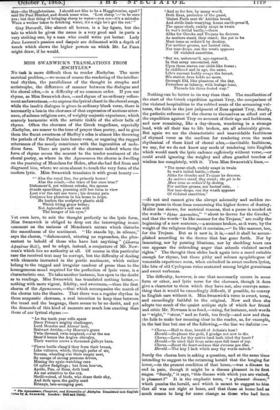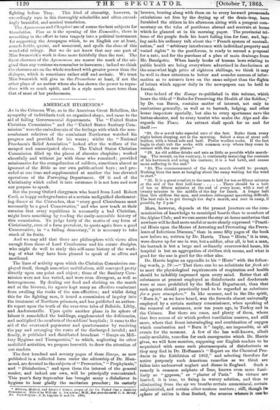MISS SWANWICK'S TRANSLATIONS FROM /ESCHYLUS.*
No task is more difficult than to render )Eschylus. The mere metrical problem,—we mean of course the rendering of the intellec- tual rhythm, the parallelisms of the thought in strophe and antistrophe, the difference of manner between the dialogue and the choral odes,—is a difficulty of no common order. If you use rhyme, as Miss Swanwick does, —and rhyme of no ordinary refine- ment andsweetness,—to express the lyrical chant in the choral songs, while the iambic dialogue is given in ordinary blank verse, there is necessarily a loss in the choruses of that expression of anxious utter- ance, of solemn religious awe, of weighty majestic experience, which scarcely harmonize with the artistic tinkle of the silver bells of rhyme. Often the choruses of the Greek tragedians, especially 2Eschylua, are nearer to the tone of prayer than poetry, and to give them the fluent sweetness of Shelley's odes is almost like throwing the periods of the Psalms into heroic verse, or sugaring the rugged utterances of the moody conscience with the ingenuities of melo- dious form. There are parts of the choruses indeed where the form of rhyme seems the nearest to the tender sentiment of the choral poetry, as where in the Agamemnon the chorus is dwelling on the yearning of Menelaus for Helen, after she had fled from and disgraced him, where we seem almost to touch the very form of the modern lyric. Miss Swanwick translates it with great beauty :- "' Alas the royal line, the princely house !
Alas the couch,—the trace of her once true !'
Dishononed, yet without rebuke, the spouse Stands speechless, yearning still her form to view Lost o'er the salt sea wave ; his dreamy pain Conjures her phantom in his home to reign.
He loathes the sculptor's plastic skill Which living grace belies; Not Aphrodite's self can still The hunger of his eyes."
Yet even here, to suit the thought perfectly to the lyric form, Miss Swanwick is obliged to drop out the interrupting ironic comment on the easiness of Menelaus's nature which disturbs the smoothness of the sentiment. " Ile stands by, in silence," says the chorus, "dishonoured, uttering no reproaches, the plea- santest to behold of those who have lost anything" (caurrss apstsivon, tts7✓), and to adopt, instead, a conjecture of Mr. New- man's which has no authority at all. Of course in this particular case the received text may be corrupt, but the difficulty of dealing with elements incrusted in the poetic sentiment, which rather belong to the rugged and irregular candour of prose than to the homogeneous mood required for the perfection of lyric verse, is a characteristic one. To take another instance, less open to the doubt as to readings. Miss Swanwick has translated nothing better,— nothing with more vigour, fidelity, and sweetness,—than the first chorus of the Agamemnon,—that which accompanies the march of the chorus into the theatre. That there was a regular rhythm in these anapaestic choruses, a real intention to keep time between the tread and the language, there seems to be no doubt, and yet the demands of this kind of measure are much less exacting than those of our lyrical rhyme :— " Lc the tenth year rolls apace
Since Priam's mighty challenger, Lord Menelas and Atreus' heir, Stalwart Atridas,—by Heaven's grace Twin-throned, twin-sceptred,—o'er the sea Steer'd hence the Argive chivalry, Their warrior crews a thousand galleys bare.
"Fierce battle clang'd they from their breast, Like vultures, which, through paths of air, Scream, wheeling o'er their empty nest, By oarage of strong pennons driven, Missing the eyrie-watching care Of callow fledglings ; but from heaven, Apollo, Pan, or Zeus, doth lend An ear attentive to the cry, Shrill-voiced, of birds, who share their sky, And doth upon the guilty send Erinnys, late-avenging pest.
The Agamemnon, Choephort, and Eutnenida of.Erchylta. Translated into English cerhe by).. StanwieL London: Ban and Daldy.
"And so for her, by many wood, Doth Zeus, protector of the guest, 'Gainst Paris sent th' Atridan brood, And strife limb-wearying, knees earth-preyed, The spear-shaft, rudely snapt in twain In war's initial battle,—these Alike for Greeks and Trojans he decrees.
As matters stand, they stand; the yet to be Must issue as ordain'd by destiny, For neither groans, nor lustre]. rain, Nor tear-drops, can the wrath appease Of violated sanctities.
"But we, unhonour'd, age-oppress'd, In that array uncounted, rest Upon these staves our child-like frame ; In childhood and in age, the same, Life's current feebly sways the breast. His station Ares holds no more, Decrepit Eld, like phantom of the day, Powerless as infancy, with leafage hoar, Threads his three-footed way."
Nothing can be better in its way than that. The recollection of the start of the Greek expedition against Troy, the comparison of the violated hospitalities to the robbed nests of the screaming vul- tures, the faith in the just judgment of Zeus against Troy, finally, the pathetic reference of the chorus to themselves as sifted out of the expedition against Troy on account of their age and feebleness, and now remaining, like a day-dream, wandering in a strange land, with all their ties to life broken, are all admirably given. But again we see the characteristic and unavoidable faultiness of rhymed verse as the medium for rendering even the most rhythmical of these kind of choral odes,—inevitable faultiness, we say, for we do not know any mode of rendering into English which would mark the lyric cadence sufficiently without verse,—or could avoid ignoring the weighty and often gnarled touches of wisdom too completely, with it. Thus Miss Swanwick's lines,— " The spear-shaft, rudely snapt in twain In war's initial battle,—these Alike for Greeks and Trojans he decrees. As matters stand they stand; the yet to be Must issue as ordain'd by destiny,
For neither groans, nor lustral rain, . Nor tear-drops, can the wrath appease Of violated sanctities,"
not and cannot give the abrupt solemnity and sudden re- ligious pause in these lines concerning the higher decree of destiny- Muller has shown, for metrical reasons, that a pause is needed at the words " Bnawv Davao7mv," " about to decree for the Greeks," and that the words "In like manner for the Trojans," are really this
beginning of a new sentence,—a sentence broken, as it were, by the weight of the religious thought it contains,—" In like manner, too, for the Trojans. But as it now is, it is,—and it shall be accom- plished according to the decree that has gone forth. Nor by lamenting, nor by pouring libations, nor by shedding tears can one appease the unbending anger that attends violated sacred rights." The thought then slides back again into a mood suitable enough for rhyme, but these pithy and solemn apophthegms of venerable experience seem, when embodied in sweet modern lyrics, like bits of old Cyclopean ruins scattered among bright geraniums and sweet verbenas.
The difficulty, however, is one that necessarily occurs in some form or other, and lyric verse for the choruses, though it does. give a character to them which they have not, also conveys some- thing that it would be exceedingly difficult, if possible, to convey to English ears without it. Miss Swanwick's verse is sweet, terse, and exceedingly faithful to the original. Now and then she adopts too much of the quaint antique style of which her friend and critic Mr. Newman is so fond,—using, for instance, such words as " wight," " stour," and so forth, too freely—and now and then &he fails to make her meaning clear to the reader, as, for example, in the last line but one of the following,—the line we italicize :-
" Chorus.—Hail to thee, herald of Achaia's host ! Herald—So please the gods, I grudge not now to die. Chorus.—Love for thy native land hath tried thy heart ? Herald—So tried that from mine eyes fall tears of joy. Chorus.—Sweet the heart-sickness that o'ercarne you thus. Herald—The key I lack which may thy words unlock."
Surely the chorus here is asking a question, and at the same time intending to suggest to the returning herald that the longing for home,—in the present condition of that home,—was a disease to end in pain, though it might be a disease pleasant in its first stages. "Surely," it says, "this disease with which you are visited, is pleasant P" It is the emphatic term, " a pleasant disease,' which puzzles the herald, and which is meant to suggest to hiss that all was not right at home, and that those at home had as much reason to long for some change as those who had been.
fighting before Troy. This kind of obscurity, however, is exceedingly rare in this thoroughly scholarlike and often exceed- ingly beautiful, and musical translation.
The Agamemnon and Choephori are of course the best subjects for translation. Fine as is the opening of the Eumenides, there is something in the effort to turn tragedy into a political instrument for supporting the Areopagus which, to an English ear at least, sounds feeble, quaint, and unnatural, and spoils the close of this wonderful trilogy. But we do not know that any one part of Miss Swanwick's work is done more faithfully than the rest. The finest choruses of the Agamemnon are nearer the mark of the ori- ginal than any versions we remember to have seen ; indeed we think the choruses are on the whole rendered with greater power than the dialogue, which is sometimes rather stiff and archaic. We trust Miss Swanwick will give us the Prometheus at least, if not the other plays of an author whom she has shown the power to repro- duce with so much spirit, and in a style much more terse than that of most of her predecessors.































 Previous page
Previous page